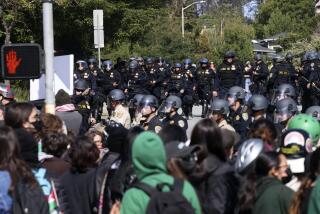S. Africa Police Reportedly Force Boycotting Students Into Classes
- Share via
JOHANNESBURG, South Africa — Armed police patrolled an affluent Asian school Thursday, witnesses said, forcing students to attend class and perhaps signaling a tougher attitude toward boycotts that white authorities see as a catalyst of anti-apartheid protest and violence.
The action at Rylands High School near Cape Town was the first time in 16 months of unrest that police and soldiers acted to make sure classes were held. Students, teachers and other witnesses said the officers stood in the classroom doorways and patrolled the halls.
Boycotts have been most common in black schools since the current protest against white-minority rule, in which as many as 1,000 people have been killed, began in September, 1984.
Violent protest often starts with a core of black boycotters intimidating other students into staying away from class. The youngsters roam the streets, stoning vehicles, and police often respond with tear gas and gunfire.
Some Balked at Entering
Students at Rylands, who have supported the boycott movement, gathered on the grounds before classes Thursday. Witnesses said some balked at entering the building, then police appeared and drove them inside.
“Do they think we were learning anything?” one student asked later, speaking privately for fear of reprisal.
According to the reports from Rylands, more than a dozen policemen who appeared to have been hiding in the building rushed out when the students balked at going to class and herded them inside. Soldiers appeared on the perimeter of the grounds to keep the youngsters from fleeing, the witnesses said.
Several students said they planned to boycott classes today. Which side the teachers were on was not clear, but many secondary school and university instructors in the Cape Town area have sided with student strikers.
From Wealthy Families
Students at Asian-only Rylands High dress in neat, compulsory uniforms, and some residents of Cape Town call them the “Mercedes and BMW set” because many are from wealthy families.
Most of the country’s 850,000 Asians, as they are officially classified, are descended from Indian laborers who came to South Africa a century ago. Apartheid forces them to live in their own segregated townships, usually near black or mixed-race districts and far from white neighborhoods.
In Lesotho, the small country surrounded by South Africa, calm was reported in Maseru, the capital, in the wake of Wednesday’s action by paramilitary forces, which surrounded government buildings for several hours. Information Minister Desmond Sixishe maintained that the action was in response to a bomb scare, and Lesotho’s military commander, Maj. Gen. Justin Lekhanya, made repeated broadcasts on government radio saying, “The paramilitary remains loyal to the government.”
There had been speculation of a coup attempt, perhaps related to tightened border security by South Africa that has brought shortages of food, fuel and other supplies in Lesotho.
More to Read
Sign up for Essential California
The most important California stories and recommendations in your inbox every morning.
You may occasionally receive promotional content from the Los Angeles Times.










